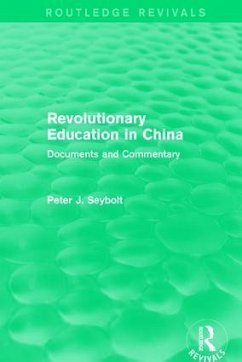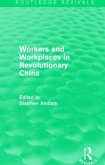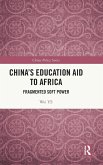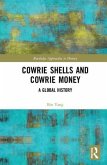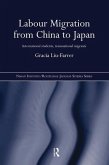- Gebundenes Buch
- Merkliste
- Auf die Merkliste
- Bewerten Bewerten
- Teilen
- Produkt teilen
- Produkterinnerung
- Produkterinnerung
Originally published in 1973, this title analyses revolutionary changes in the Chinese education system and illustrates China's radical departure from both traditional and Western goals. This title is ideal for students interested in Asian Studies and History.
Andere Kunden interessierten sich auch für
![Workers and Workplaces in Revolutionary China Workers and Workplaces in Revolutionary China]() Workers and Workplaces in Revolutionary China253,99 €
Workers and Workplaces in Revolutionary China253,99 €![Siberian Exile and the Invention of Revolutionary Russia, 1825-1917 Siberian Exile and the Invention of Revolutionary Russia, 1825-1917]() Ben PhillipsSiberian Exile and the Invention of Revolutionary Russia, 1825-1917198,99 €
Ben PhillipsSiberian Exile and the Invention of Revolutionary Russia, 1825-1917198,99 €![China's Education Aid to Africa China's Education Aid to Africa]() Wei YeChina's Education Aid to Africa198,99 €
Wei YeChina's Education Aid to Africa198,99 €![Cowrie Shells and Cowrie Money Cowrie Shells and Cowrie Money]() Bin YangCowrie Shells and Cowrie Money198,99 €
Bin YangCowrie Shells and Cowrie Money198,99 €![Labour Migration from China to Japan Labour Migration from China to Japan]() Gracia Liu-FarrerLabour Migration from China to Japan209,99 €
Gracia Liu-FarrerLabour Migration from China to Japan209,99 €![African Science Education African Science Education]() African Science Education209,99 €
African Science Education209,99 €![The China-Japan Conflict over the Senkaku/Diaoyu Islands The China-Japan Conflict over the Senkaku/Diaoyu Islands]() Anna CostaThe China-Japan Conflict over the Senkaku/Diaoyu Islands209,99 €
Anna CostaThe China-Japan Conflict over the Senkaku/Diaoyu Islands209,99 €-
-
-
Originally published in 1973, this title analyses revolutionary changes in the Chinese education system and illustrates China's radical departure from both traditional and Western goals. This title is ideal for students interested in Asian Studies and History.
Hinweis: Dieser Artikel kann nur an eine deutsche Lieferadresse ausgeliefert werden.
Hinweis: Dieser Artikel kann nur an eine deutsche Lieferadresse ausgeliefert werden.
Produktdetails
- Produktdetails
- Verlag: Routledge
- Seitenzahl: 464
- Erscheinungstermin: 5. Januar 2016
- Englisch
- Abmessung: 240mm x 161mm x 29mm
- Gewicht: 857g
- ISBN-13: 9781138194366
- ISBN-10: 1138194360
- Artikelnr.: 43775227
- Herstellerkennzeichnung
- Libri GmbH
- Europaallee 1
- 36244 Bad Hersfeld
- gpsr@libri.de
- Verlag: Routledge
- Seitenzahl: 464
- Erscheinungstermin: 5. Januar 2016
- Englisch
- Abmessung: 240mm x 161mm x 29mm
- Gewicht: 857g
- ISBN-13: 9781138194366
- ISBN-10: 1138194360
- Artikelnr.: 43775227
- Herstellerkennzeichnung
- Libri GmbH
- Europaallee 1
- 36244 Bad Hersfeld
- gpsr@libri.de
Peter J. Seybolt
Introduction; Part I: History of the Struggle over Educational Policy; 1.
Chronology of the Two-Road Struggle on the Educational Front in the Past
Seventeen Years; Part II: General Directives; 2. Quotations from Chairman
Mao 3. Universities and Middle and Primary Schools Should All Resume
Classes and Make Revolution 4. Shorten the Period of Schooling and
Revolutionize Education 5. The Working Class must Exercize leadership in
Everything; Part III: Educating the Elites; 6. The 'May 7' Cadre School 7.
On the Reeducation of Intellectuals 8. Wholeheartedly Complete
'Reeducation' Work; Part IV: Control of the Schools; 9. Chairman Mao's
(March 7)Directive Concerning the Great Strategi Plan for the Great
Proletarian Cultural Revolution 10. Thoroughly Implement the Latest
Directive of our Great Leader Chairman Mao, and Firmly Execute the Battle
Orders Issued by the Proletarian Headquarters 11. School Management by Poor
and Lower-Middle Peasants as Shown by the Practice of Three Production
Brigades in the Educational Revolution 12. Consolidate the Leadership of
the Working Class Over the Educational Revolution; V. Teachers and Teaching
; 13. Taking a Joyous Step Forward in the Educational Revolution 14.
Strengthen the Building of the Ranks of Urban Primary and Middle School
Teachers 15. A 'Mobile University' for Training of Teachers with Greater,
Faster, Better, and More Economical Results; Part VI: Short-Term training
Classes; 16. Four New Kinds of Schools; VII: Elementary Education, Rural
Schools; 17. A Primary School Run by the People Under the Control of the
Poor and Lower-Middle Peasants 18. The Poor and Lower-Middle Peasants Have
Acquired Socialist Culture 19. A Network for Popularizing Socialist
Education; VIII: Middle Schools, Physical Ecuation; 20. A Middle School
Serving the Three Great Revolutionary Movements 21. How Did We Initiate
'Industrial Studies' Activities? 22. Mass Physical Training; Part IX:
Higher-Level Technical Training; 23. The Way to train Engineer and
Technical Personnel as Viewed from the Shanghai Machine-Tool Plant 24.
Strive to Build a Socialist University of Science and Engineering; Part X:
Liberal Arts Colleges; 25. Liberal Arts Universities Must Carry Out
Revolutionary Mass Criticism 26. Reform Liberal Arts Universities Through
Revolutionary Mass Criticism; Part XI: The Yenan Background; 27.
Educational Method at K'angsta 28. The Problem of Transforming General
Education in the Base Areas 29. On Regulations and Curriculum in General
Education 30. Border Region Government Directive on promoting the Study of
Model Schools and on Experimentation with Popular-Management Primary
Schools (April 18, 1944) 31. Regarding the New Curriculum for Middle
Schools 32. Yenan University Educational Policy and Temporary regulations
(May 21, 1944); Appendix; Biographical Guide; Glossary
Chronology of the Two-Road Struggle on the Educational Front in the Past
Seventeen Years; Part II: General Directives; 2. Quotations from Chairman
Mao 3. Universities and Middle and Primary Schools Should All Resume
Classes and Make Revolution 4. Shorten the Period of Schooling and
Revolutionize Education 5. The Working Class must Exercize leadership in
Everything; Part III: Educating the Elites; 6. The 'May 7' Cadre School 7.
On the Reeducation of Intellectuals 8. Wholeheartedly Complete
'Reeducation' Work; Part IV: Control of the Schools; 9. Chairman Mao's
(March 7)Directive Concerning the Great Strategi Plan for the Great
Proletarian Cultural Revolution 10. Thoroughly Implement the Latest
Directive of our Great Leader Chairman Mao, and Firmly Execute the Battle
Orders Issued by the Proletarian Headquarters 11. School Management by Poor
and Lower-Middle Peasants as Shown by the Practice of Three Production
Brigades in the Educational Revolution 12. Consolidate the Leadership of
the Working Class Over the Educational Revolution; V. Teachers and Teaching
; 13. Taking a Joyous Step Forward in the Educational Revolution 14.
Strengthen the Building of the Ranks of Urban Primary and Middle School
Teachers 15. A 'Mobile University' for Training of Teachers with Greater,
Faster, Better, and More Economical Results; Part VI: Short-Term training
Classes; 16. Four New Kinds of Schools; VII: Elementary Education, Rural
Schools; 17. A Primary School Run by the People Under the Control of the
Poor and Lower-Middle Peasants 18. The Poor and Lower-Middle Peasants Have
Acquired Socialist Culture 19. A Network for Popularizing Socialist
Education; VIII: Middle Schools, Physical Ecuation; 20. A Middle School
Serving the Three Great Revolutionary Movements 21. How Did We Initiate
'Industrial Studies' Activities? 22. Mass Physical Training; Part IX:
Higher-Level Technical Training; 23. The Way to train Engineer and
Technical Personnel as Viewed from the Shanghai Machine-Tool Plant 24.
Strive to Build a Socialist University of Science and Engineering; Part X:
Liberal Arts Colleges; 25. Liberal Arts Universities Must Carry Out
Revolutionary Mass Criticism 26. Reform Liberal Arts Universities Through
Revolutionary Mass Criticism; Part XI: The Yenan Background; 27.
Educational Method at K'angsta 28. The Problem of Transforming General
Education in the Base Areas 29. On Regulations and Curriculum in General
Education 30. Border Region Government Directive on promoting the Study of
Model Schools and on Experimentation with Popular-Management Primary
Schools (April 18, 1944) 31. Regarding the New Curriculum for Middle
Schools 32. Yenan University Educational Policy and Temporary regulations
(May 21, 1944); Appendix; Biographical Guide; Glossary
Introduction; Part I: History of the Struggle over Educational Policy; 1.
Chronology of the Two-Road Struggle on the Educational Front in the Past
Seventeen Years; Part II: General Directives; 2. Quotations from Chairman
Mao 3. Universities and Middle and Primary Schools Should All Resume
Classes and Make Revolution 4. Shorten the Period of Schooling and
Revolutionize Education 5. The Working Class must Exercize leadership in
Everything; Part III: Educating the Elites; 6. The 'May 7' Cadre School 7.
On the Reeducation of Intellectuals 8. Wholeheartedly Complete
'Reeducation' Work; Part IV: Control of the Schools; 9. Chairman Mao's
(March 7)Directive Concerning the Great Strategi Plan for the Great
Proletarian Cultural Revolution 10. Thoroughly Implement the Latest
Directive of our Great Leader Chairman Mao, and Firmly Execute the Battle
Orders Issued by the Proletarian Headquarters 11. School Management by Poor
and Lower-Middle Peasants as Shown by the Practice of Three Production
Brigades in the Educational Revolution 12. Consolidate the Leadership of
the Working Class Over the Educational Revolution; V. Teachers and Teaching
; 13. Taking a Joyous Step Forward in the Educational Revolution 14.
Strengthen the Building of the Ranks of Urban Primary and Middle School
Teachers 15. A 'Mobile University' for Training of Teachers with Greater,
Faster, Better, and More Economical Results; Part VI: Short-Term training
Classes; 16. Four New Kinds of Schools; VII: Elementary Education, Rural
Schools; 17. A Primary School Run by the People Under the Control of the
Poor and Lower-Middle Peasants 18. The Poor and Lower-Middle Peasants Have
Acquired Socialist Culture 19. A Network for Popularizing Socialist
Education; VIII: Middle Schools, Physical Ecuation; 20. A Middle School
Serving the Three Great Revolutionary Movements 21. How Did We Initiate
'Industrial Studies' Activities? 22. Mass Physical Training; Part IX:
Higher-Level Technical Training; 23. The Way to train Engineer and
Technical Personnel as Viewed from the Shanghai Machine-Tool Plant 24.
Strive to Build a Socialist University of Science and Engineering; Part X:
Liberal Arts Colleges; 25. Liberal Arts Universities Must Carry Out
Revolutionary Mass Criticism 26. Reform Liberal Arts Universities Through
Revolutionary Mass Criticism; Part XI: The Yenan Background; 27.
Educational Method at K'angsta 28. The Problem of Transforming General
Education in the Base Areas 29. On Regulations and Curriculum in General
Education 30. Border Region Government Directive on promoting the Study of
Model Schools and on Experimentation with Popular-Management Primary
Schools (April 18, 1944) 31. Regarding the New Curriculum for Middle
Schools 32. Yenan University Educational Policy and Temporary regulations
(May 21, 1944); Appendix; Biographical Guide; Glossary
Chronology of the Two-Road Struggle on the Educational Front in the Past
Seventeen Years; Part II: General Directives; 2. Quotations from Chairman
Mao 3. Universities and Middle and Primary Schools Should All Resume
Classes and Make Revolution 4. Shorten the Period of Schooling and
Revolutionize Education 5. The Working Class must Exercize leadership in
Everything; Part III: Educating the Elites; 6. The 'May 7' Cadre School 7.
On the Reeducation of Intellectuals 8. Wholeheartedly Complete
'Reeducation' Work; Part IV: Control of the Schools; 9. Chairman Mao's
(March 7)Directive Concerning the Great Strategi Plan for the Great
Proletarian Cultural Revolution 10. Thoroughly Implement the Latest
Directive of our Great Leader Chairman Mao, and Firmly Execute the Battle
Orders Issued by the Proletarian Headquarters 11. School Management by Poor
and Lower-Middle Peasants as Shown by the Practice of Three Production
Brigades in the Educational Revolution 12. Consolidate the Leadership of
the Working Class Over the Educational Revolution; V. Teachers and Teaching
; 13. Taking a Joyous Step Forward in the Educational Revolution 14.
Strengthen the Building of the Ranks of Urban Primary and Middle School
Teachers 15. A 'Mobile University' for Training of Teachers with Greater,
Faster, Better, and More Economical Results; Part VI: Short-Term training
Classes; 16. Four New Kinds of Schools; VII: Elementary Education, Rural
Schools; 17. A Primary School Run by the People Under the Control of the
Poor and Lower-Middle Peasants 18. The Poor and Lower-Middle Peasants Have
Acquired Socialist Culture 19. A Network for Popularizing Socialist
Education; VIII: Middle Schools, Physical Ecuation; 20. A Middle School
Serving the Three Great Revolutionary Movements 21. How Did We Initiate
'Industrial Studies' Activities? 22. Mass Physical Training; Part IX:
Higher-Level Technical Training; 23. The Way to train Engineer and
Technical Personnel as Viewed from the Shanghai Machine-Tool Plant 24.
Strive to Build a Socialist University of Science and Engineering; Part X:
Liberal Arts Colleges; 25. Liberal Arts Universities Must Carry Out
Revolutionary Mass Criticism 26. Reform Liberal Arts Universities Through
Revolutionary Mass Criticism; Part XI: The Yenan Background; 27.
Educational Method at K'angsta 28. The Problem of Transforming General
Education in the Base Areas 29. On Regulations and Curriculum in General
Education 30. Border Region Government Directive on promoting the Study of
Model Schools and on Experimentation with Popular-Management Primary
Schools (April 18, 1944) 31. Regarding the New Curriculum for Middle
Schools 32. Yenan University Educational Policy and Temporary regulations
(May 21, 1944); Appendix; Biographical Guide; Glossary

